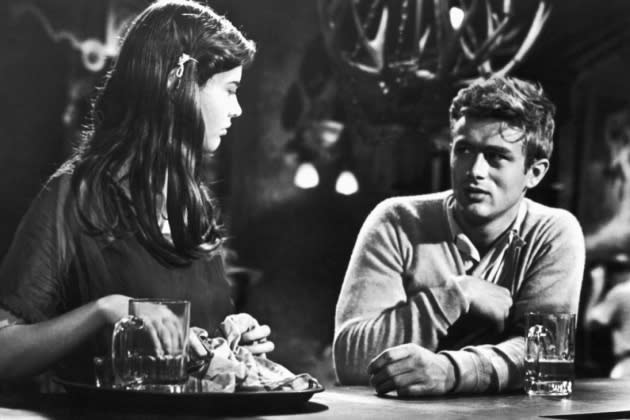‘East of Eden’: THR’s 1955 Review
- Oops!Something went wrong.Please try again later.
- Oops!Something went wrong.Please try again later.
- Oops!Something went wrong.Please try again later.

On March 9, 1955, Warner Bros. unveiled Elia Kazan’s East of Eden adaptation at its premiere at the Astor Theatre in New York. The James Dean-starring drama went on to nab four Oscar nominations at the 28th Academy Awards, winning one for supporting actress for Jo Van Fleet’s role. The Hollywood Reporter’s original review, titled “‘East of Eden’ Combines Artistry With Box Office,'” is below:
There can be no doubt as to the artistic merits of this picture. Beautifully acted, and superbly directed by Elia Kazan, it is bound to be one of the year’s important contributions to screen literature. It has a chance, also, of being something more important to the exhibitor — a big money maker. If this is to happen, a number of assets will need to be skillfully exploited. But the rewards should be worth the effort.
More from The Hollywood Reporter
First of all, there is the prestige of John Steinbeck’s novel which has had an immense circulation, particularly in the lending library field. Many commentators considered it his best, and it was certainly one of his most readable. Since it was epic in length, Kazan used only a fourth of it in the movie. Each reader doubtless has his own views of what was best. I personally found the characters of Kate, the murderess, and the Chinese servant the most fascinating. Only a small part of Kate’s baleful career is shown in the film and the Chinese isn’t there at all. Yet, in spite of some disappointment and prejudice, I found the part of the story that Kazan chose to tell as complete a drama as the best of O’Neill’s tragedies and one that preserves the flavor that made Steinbeck’s book important. I, therefore, think that the reading public will accept the movie with considerable enthusiasm.
Theatre men also should be prepared to take advantage of the accolades with which Kazan always is greeted by the liberal press. The reception of On the Waterfront proved how commercially important this can be. As in the case of that picture, East of Eden is backed up by masterful screen storytelling that can hardly be overpraised and is complicated by no message that can be termed controversial.
But the box office asset that is most important is the debut, in the leading role, of a handsome and dynamic young actor named James Dean. This is the boy who is apt to captivate the typical movie fans whether or not they like tragic stories. He is that rare thing, a young actor who is a great actor and the troubled eloquence with which he puts over the problems of misunderstood youth may lead to his being accepted by young audiences as a sort of symbol of their generation. He’s the only player I’ve ever seen who’d be completely right for Romeo. It is inevitable that he will be compared to Marlon Brando, though he is no carbon copy of that capable player. He has a completely individual screen personality. If this film is to reap the profit it deserves, no time should be lost in giving him a big fan magazine buildup, not because he is trivial, but because it’s the quickest way to rally young people to his support.
Paul Osborn’s screenplay pivots on the heartache young Cal Trask suffers when he learns that his mother, long believed to be dead, is running a sporting house in Monterey. The tortured boy tells himself this is why he is “no good” and that it explains why his father (Raymond Massey) does not love him. Under the influence of a sympathetic sheriff (admirably played by by Burl Ives), the kid struggles to recoup the losses his father suffered in an unsuccessful effort to refrigerate lettuce. The scene in which the father rejects this gift is one of the most heartbreaking that you’ll ever see in the theatre. Filled with a blind fury for revenge the repudiated son drags his more favored brother (Richard Davalos) to the brothel to show him what kind of a mother they have. When the disillusioned brother leaves for the war, the father suffers a stroke and Cal Trask, cut off from his father’s love, seems permanently enlisted in the ranks of the damned. But the brother’s sweetheart, Abra, succeeds in building a bridge between the stricken father and the repentant son.
All the players are required to give remarkable performances, since all the characters contain the good and bad that is found in most human beings. Julie Harris, as Abra, combines a young girl’s silliness with a mystic, almost breathless, virginal delicacy. Massey, as the father, shuns black-and-white effects by showing that religion can make a man narrow in some things and extremely sweet and lovable in others. Young Davalos, in a restricted amount of film, manages to show that the “good” brother has inherited certain lurking traits of meanness from his mother. Jo Van Fleet, as the evil mother, is so convincing that I hope I may yet see her give a complete rendition of that fascinating character. Lois Smith is quite wonderful as a slavey in Kate’s joint and Barbara Baxley is out standing as the bitchy nurse who motivates the final climax.
All the technical departments harmonize their talents to produce a rare example of artistic unity with Ted McCord’s photography, particularly the location shots, making the backgrounds of the Salinas Valley an essential part of the story. Leonard Rosenman’s score, which is universally good, is distinguished by a poignantly lyric theme in the young love passages. — Jack Moffitt, originally published on Feb. 16, 1955.

